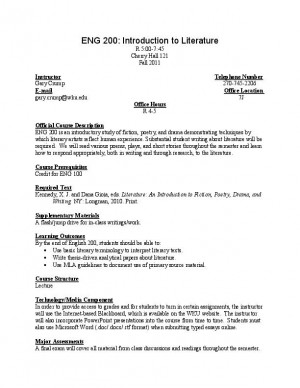English class ‘decency’ policy causes concern

December 4, 2012
When William Hyde saw the syllabus for his English 200 course, he expected to find a reading list, not a decency list.
That’s exactly what the Nashville junior discovered as he looked over instructor Gary Crump’s syllabus for the first time, and it shocked him.
“I was appalled by the strong wording of a decency policy, something I’d never seen before in a syllabus,” he said. “Honestly, I was offended by its sexism.”
The decency policy mentions examples of inappropriate dress, students being unable to return to class until dressed properly, and inappropriate dress potentially affecting a student’s participation grade.
Hyde dropped the class in the first couple of weeks of the semester. The English major said he felt Crump seemed to hold a grudge for openly having an issue with the syllabus. Hyde also said he later discovered he didn’t need to take the class.
A current student, who wished to remain anonymous, said she was shocked when she read the syllabus but said the dress code has become less of an issue after the first weeks of class.
“My response to his syllabus was kind of shocking when I heard he had that policy because when kids go to college that’s the one thing they enjoy, being able to dress the way they like with no restrictions,” she said in an email. “At first I thought it was going to be really bad, like high school when they checked us in the morning, but he was not repetitive about it because so far no one has violated it.”
The College Heights Herald contacted Crump on multiple occasions, but Crump chose not to comment, citing a busy schedule. Crump deferred any comment to his department head.
Andrew McMichael, interim English department head and assistant dean of Potter College of Arts and Letters, said he came across the dress code shortly after the beginning of the semester.
“A professor can’t have a dress code,” McMichael said. “You cannot grade a student based on that, either.”
McMichael said he doesn’t remember the exact circumstances of how he found the syllabus, but he said Crump was “really compliant” with the changes. McMichael said no disciplinary actions were needed because of Crump’s willingness to change his syllabuses.
“He took it out and uploaded a new syllabus on TopNet almost immediately,” McMichael said of the interaction that happened in early September.
Currently, all policies regarding course syllabuses are enforced on a departmental level, according to a WKU Policy & Procedure document.
The policy document doesn’t mention allowing for a dress code or a decency policy, but it allows professors to include “factors to be considered in determining grades and the specific weight to be assigned to each of these factors.”
Deborah Wilkins, chief of staff and general counsel, said she doesn’t see the need for a dress code in the course, but a uniformly applied dress code could potentially be enforced if it was directly connected to the curriculum.
“If the professor can state a valid reason that’s supported by the department head and the dean that students need to dress a certain way in his class, then yes, but it’s one of those things you’d have to look at on a case-by-case basis,” she said.
But if a student only has the clothes they show up to class in, they shouldn’t be turned away, Wilkins said.
“Students come from different socio-economic backgrounds, and they don’t always have business attire,” she said.
“What they wear might not be up to someone else’s standards in terms of neatness or newness or fashion, but it’s what they have, and we need to be mindful of that. Not everybody comes from a closet full of designer clothes or from a background where Mom and Dad put on suits and go to work.”
As for the revised syllabus, Wilkins approved of removing the connection between student’s clothing choice and a graded component. However, the wording of “decent” and “appropriate” is still problematic, Wilkins said.
She cited the WKU Student Handbook, Sections 11 and 12, which deal with academic disruptions and class conduct, respectively.
“A student’s attire should only be an issue when it is disruptive or ‘interferes with, impedes, impairs or obstructs’ teaching,” Wilkins said in an email. “So, if a student comes to class nude from the waist down, that would arguably be disruptive. If they come to class in flannel pajamas, probably not. But again, all this must be examined on a case-by-case basis.”
Despite the syllabus, McMichael said he’s heard nothing but “glowing reviews” of Crump’s performance as an instructor.
“He’s very popular with his students,” McMichael said.
























